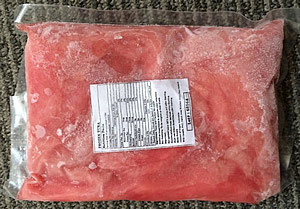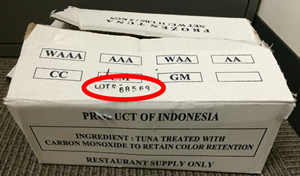The Minnesota Department of Health has announced that two Minnesota residents sickened with salmonellosis are linked to frozen raw tuna. They are part of a larger national outbreak that was linked to spicy tuna rolls purchased at a grocery store and workplace cafeteria.
The outbreak strain of Salmonella was found in sealed bags of frozen raw tuna from the lot used to make the spicy tuna rolls eaten by one of the patients. This tuna was packaged in frozen, vacuum-sealed bags without a brand name. The labels identify the product: lot number 68568 and Indonesia as the country of origin.


The tuna was distributed by Osamu Corporation of Gardena, California. Retail stores should not sell and consumers should not eat tuna from this lot. Grocery stores should check their supply for any boxes or bags labeled with this number or name. If you are not sure whether or not you purchased this product, check with your grocery store.
Noted food safety attorney Fred Pritzker is calling for increasing the inspections of foreign food sites after this outbreak. “Global food trading is increasing and we have to increase inspections to keep consumers safe from deadly diseases.”
The patients are adults in their 30s from the metro area who became ill on June 21 and June 30, 2015. This is later than the larger outbreak, in which illness onset dates were from March 5, 2015 through May 3, 2015. Neither was hospitalized. But Salmonella infections can have long-term serious consequences, including reactive arthritis, irritable bowel syndrome, and heart problems.
The symptoms of a Salmonella infection include abdominal pain and cramps, diarrhea that may be bloody, vomiting, nausea, and fever. The symptoms usually begin 12 to 72 hours after exposure. About 20% of lab-confirmed Salmonella cases require hospitalization. Some people can develop blood stream infections and meningitis as a complication. If you ate raw tuna and experienced these symptoms, please see your doctor for care.




